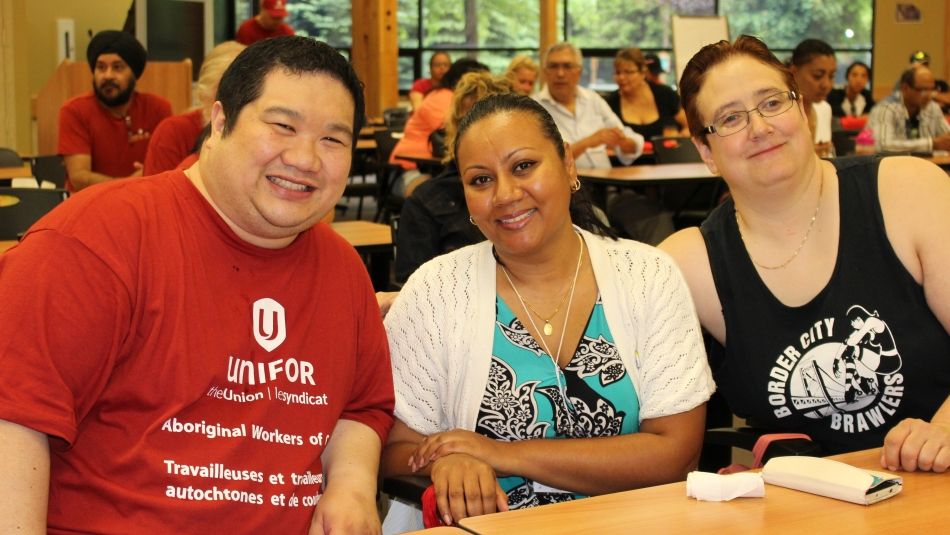
Leadership Development Opportunity – 4-Week Paid Education Leave
The Unifor Education department is excited to bring back our 4-week program, which has been an important foundation for many leaders and activists in our union. It is by far our most comprehensive and in-depth program. Covering topics such as the economy, politics, globalization, equality and social movements, one of our key goals is to develop and deepen a sense of working class identity – a strong and meaningful connection to our union and our vision for the working class. The program engages participants on current issues and to orient and engage around the work of our union and our social justice allies.
Beyond the classroom, participants will engage in committee work on current issues throughout their 4 weeks.
Participants are required to enroll in all 4 weeks of the program.
Apply
Participants and their Local Union executive may download and complete the application form. Applicants cannot approve their own payroll/expense form. This form must be signed by the Local Union President, Secretary-Treasurer or Chairperson other than oneself.
4-Week PEL Student Application Form 2024
Week 1: Unifor Foundations
This is a course for members, activists and leaders. The course begins by examining the nature of work and exploring what workers have in common today. We look at how work, conditions of work, and control over work have been shaped by the development of the capitalist system from colonialism to the present day.
Starting with our experiences as workers and community members, we examine various ways that governments have responded to global and corporate pressures and how this directly impacts our life experiences – from our health, to where we live and work, to what we eat, to how we spend our time.
We’ll explore how unions work, what we do for workers, and how unions have changed the nature of work and helped shape society. We’ll investigate our own union’s history and consider the challenges we face today. We’ll look at basic principles of collective bargaining, union democracy, labour’s role in politics, working class diversity, and union renewal. We’ll include a focus on ways that working people have envisioned and fought for a more just and equal society.
Week 2: Human Rights
This 1-week program is critical for leadership and activists, as we learn together how to build a strong, united union committed to social justice. Racism, homophobia, sexism, disability prejudice and other forms of discrimination divide us as workers and weaken our union. This course asks each of us to take on the challenge of working toward real equality, by first understanding how oppression works, by examining where, how and why discrimination occurs, and then by debating, and committing to strategies for change.
Participants will become familiar with Unifor structures, resources, education programs and networks for advancing human rights and equality struggles in the workplace. Participants are provided with a Human Rights Tool Kit and are asked to consider tough topics such as harassment and employment equity, and to engage each other in challenging conversations. The course includes a focus on the role of allies and shows how human rights struggles can strengthen the union.
*If 4-week PEL participant has already taken the human rights program, they will be enrolled in: Turtle Island: A First Peoples Awareness for Union Activists and Leaders.
Week 2: Turtle Island: A First Peoples Awareness for Union Activists and Leaders.
In this course, we will explore the shared history between indigenous and non-indigenous people. Turtle Island is the name used for North America in some aboriginal cultures and refers to a story about the origin of the earth.
Week 3: Canada & The World
In today’s world, where trade deals and global competition have workers struggling to maintain their rights, solidarity is more important than ever. This course will reflect on our connections to workers around the world and look at some alternatives to the environmental, political and social problems we face.
As the week unfolds, we will examine the roles played by corporations, government, the mass media, workers and consumers in this system of global capitalism. We’ll look at the extraction, production, distribution, consumption and disposal of products we use, and we’ll look at the changing nature of public services. We’ll compare how workers in Canada and workers elsewhere in the world are responding to global capitalism, and we’ll look at ways we can work together. Participants will have a chance to practice bringing a current international campaign to the local union and our communities.
Join us as we sharpen our analysis, learn more about the world of work and workers, and develop our confidence to change the course of global capitalism.
Week 4: From Discussion to Action
Building on the previous three weeks, participants will learn how to take concrete, action-oriented steps to affect change in the union, in the community and at the municipal, provincial and federal levels of politics. We will deep dive into the critical pillars of activism, which include practical communications tools, understanding the importance and the nuts & bolts of campaigns, advocacy and membership mobilization. Participants will engage and build confidence through hands-on activities such as lobbying, public speaking, developing a communications strategy and learning about direct action techniques.
Through this course, participants will hear about history, indigenous rights, indigenous issues, and the links between social unionism and the struggle for self-determination.
We will discuss reconciliation and ways in which the labour movement can share in the process of recognizing and addressing injustices both historic and contemporary.


